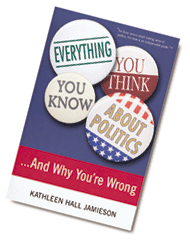
Millions of television viewers will
tune in this fall to watch Vice President Al Gore and Texas Governor George
W. Bush match rhetorical wits, and will stay tuned as the networks report
who won each debate. What they probably won’t realize is that the polls
designed to gauge a winner are “rigged,” says Dr. Kathleen Hall Jamieson,
dean of the Annenberg School for Communication and director of the Annenberg
Public Policy Center.
Rather
than surveying a random sampling of all debate viewers, the pollsters
choose a pool of respondents that has been weighted to reflect the candidates’
pre-debate standings, she explains. “They should abolish the [debate]
poll. It’s absolutely meaningless and creates a self-fulfilling prophecy”
that, in most cases, “helps the front-runner.”
It turns out that what most
of us don’t realize about political campaigns could—and now does—fill
a book. To set the record straight, Jamieson—with the help of an Annenberg
research team that examined presidential campaign communications since
1952 and conducted several voter surveys—has written Everything You
Think You Know About Politics … And Why You’re Wrong (Basic Books).
For example, despite what
“everyone knows,” it turns out that: political attack ads have not increased
in recent campaign history; elected presidents from Kennedy to Clinton
have succeeded in keeping most of their campaign promises; voter
turnout isn’t quite as low as it’s made out to be.
Jamieson also notes that
the media is biased in its campaign coverage—not in the way some
conservatives assume but because it focuses on strategy-oriented rather
than issue-oriented coverage, to the detriment of whoever seems to be
behind in the polls.
“It’s irresistible because
it’s so easy to write,” she says. “You don’t have to know anything about
policy positions of candidates, just to say ‘He attacked’ and ‘He responded.’”
As food for thought, Jamieson
handed out copies of her book along with a new CD-ROM, The Annenberg/Pew
Archive of Presidential Campaign Discourse, to reporters covering
the Republican National Convention. Collected in this searchable database
are presidential speeches, ads and debates from 1952 to 1996 covering
topics from abortion to Zimbabwe. To assemble the material, Annenberg
students searched in attics, basements and archives around the country.
The CD-ROM reveals that
much of the campaign rhetoric has not been reliably reported by the media.
“And so some of what we’ve written as campaign history—some of what I’ve
written as campaign history—is simply wrong when you go back and read
all of the speeches” in context, Jamieson says. “We hope that [the CD]
will make it easier for reporters when they are making claims about the
best, the worst, the least and the most to temper those claims.”
The database also shows
how political rhetoric has changed over time. As Jamieson points out,
bureaucrat was “once a positive word.”
The Annenberg team’s research
continues with a survey of 100,000 people through February 2001 to find
out what it means when people do or don’t vote. Voter participation clearly
is down, though not as much as frequently cited statistics would indicate.
(They fail to take into consideration the large population of ineligible
voters, including felons and non-citizens.) “We need to know what that
means,” Jamieson says. “It could mean they’re perfectly happy with the
status quo, or that they see no difference in the candidates. Or it could
mean they’re totally dissatisfied with the political process or they’ve
lost their sense of civic duty. We don’t know.”




